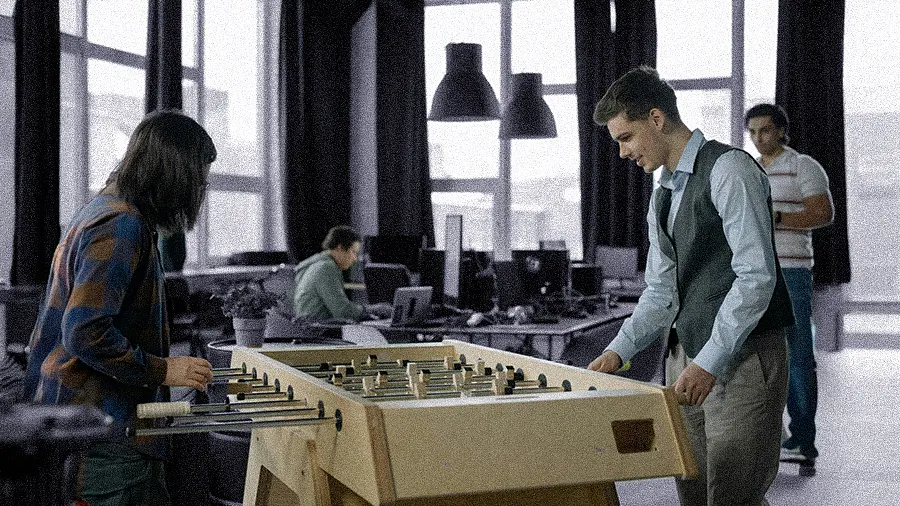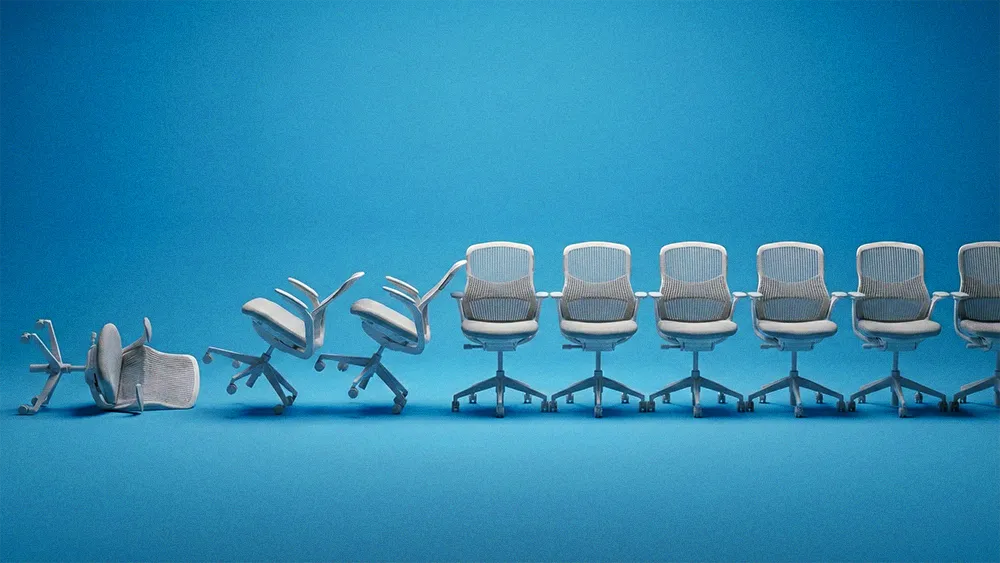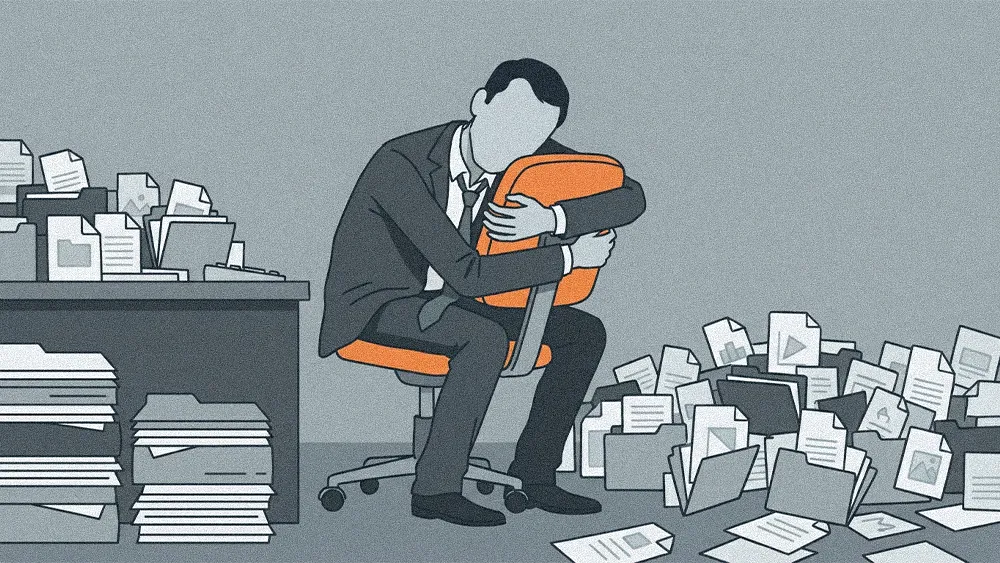The Productivity Paradox: How discussing personal interests helps elevate teams

Key Points
Many workplaces that enforce hot-desking and sterile office policies accidentally undermine the human connection required for effective teamwork.
Shawna Brothers, Director of Operations & Talent at Foresight Recruitment Group, argues that leaders should instead embrace small, authentic moments of connection to drive business results.
Drawing on examples from the German “Kaffeetante” principle to the Tiger King phenomenon, she explains how shared cultural touchstones can forge strong team bonds.
Brothers asserts that creating a psychologically safe place for employees to be themselves is the most effective way to attract and retain “rock star” talent.
I've worked with a lot of employers who want to build these new, open office spaces, but don't let people put personal items on their desk and only do hoteling. To me, those environments suggest 'I want the best of you, but I don't want all of you.'

Shawna Brothers
Director of Operations & Talent
Foresight Recruitment Group
The offices of today look nothing like they did pre-pandemic. Pushing for “better” collaboration among hybrid teams through hot-desking or hoteling has actually stripped the office of individuality and creativity. Companies demand teamwork, yet undermine the human connection required to make it work with strict personalization rules and musical chairs on desk assignments.
We spoke with Shawna Brothers, Director of Operations & Talent at Foresight Recruitment Group, a firm specializing in real estate recruitment. She argued that leaders should reconsider the traditional separation between the personal and professional, positing that small moments of human connection can drive real business results. It starts by elevating small talk. Contrasting a generic “How’s the weather?” with a specific “Oh my God, did you hear about Taylor Swift’s engagement?” illustrates the shift from impersonal to engaging.
In fact, Taylor Swift might be the secret code to cracking the personal/professional divide. A recent report from BambooHR explores Swift’s role in fostering workplace connections with 18% of workers saying her engagement news sparked widespread conversation across teams.
The Homogenization Paradox: Brothers pointed to a central conflict in many corporate environments. “I’ve worked with a lot of employers who want to build these new, open office spaces but don’t let people put personal items on their desk and only do hoteling,” she said. “To me, those environments suggest ‘I want the best of you, but I don’t want all of you.'”
The Kaffeetante Principle: From this perspective, embracing the cultural touchstones that create authentic connection can offer a more effective path than issuing top-down corporate mandates. “Someone once taught me there’s something called Kaffeetante, which is a common business practice in parts of Germany,” she explained. “You’re going to have a little conversation before you get into business. It’s about getting to know the person you’re with. Once you do that, then you can start working together.”
This principle, Brothers argued, becomes even more critical in an era of remote work. She shared a story from the early COVID-19 pandemic, when her newly nationalized HR team found a timely unifier in a Netflix docuseries. The department soon developed its own subculture of inside jokes about Tiger King, forging a strong bond among the scattered team members. “It connected all of us,” she recalled. “The next time I sat down and watched Tiger King, I actually felt connected to them.”
Brothers said the lesson from that organic moment can be turned into a repeatable strategy, especially in hiring. She shared an example of placing a candidate with a passion for Dungeons & Dragons onto a team of fellow players, deliberately engineering what she calls an “instant Tiger King moment” to serve as a shortcut to connection.
These moments can also be a source of actionable leadership lessons. Recent widespread media coverage of Taylor Swift’s new album and engagement, reported on by outlets from the BBC to local news, is a prime example of the kind of water cooler talk Brothers encourages. For her, the global phenomenon offers a key lesson in creating high-performance environments built on psychological safety.
The Rock Star Requirement: The goal, she clarified, is to create an environment where it is safe to express your own beliefs, which is more important than whether everyone is a fan of the same thing. “The biggest lesson from Taylor Swift’s impact is that it’s cool to be kind,” she said. “If we want productivity, high performers, and to get ‘rock stars’ in your organization, it needs to be a safe place for people to be themselves.”
This philosophy also shapes her perspective on a common tenet of her profession. She argued that the traditional HR practice of maintaining professional distance to make hard decisions easier is a fundamental mistake. While close connections can make those decisions more emotionally taxing, Brothers said they should be difficult. A leader’s role, she said, is to coach people on how to manage the challenging feelings that arise from these situations. The aim is to preserve the humanity of a difficult choice, rejecting the impulse to make the decision feel sterile. For her, genuine connection in the workplace is not transactional, but about simply showing up for one another.
The biggest lesson from Taylor Swift's impact is that it's cool to be kind. If we want productivity, high performers, and to get 'rock stars' in your organization, it needs to be a safe place for people to be themselves.

Shawna Brothers
Director of Operations & Talent
Foresight Recruitment Group
The biggest lesson from Taylor Swift's impact is that it's cool to be kind. If we want productivity, high performers, and to get 'rock stars' in your organization, it needs to be a safe place for people to be themselves.

Shawna Brothers
Director of Operations & Talent
Foresight Recruitment Group
Related articles
TL;DR
Many workplaces that enforce hot-desking and sterile office policies accidentally undermine the human connection required for effective teamwork.
Shawna Brothers, Director of Operations & Talent at Foresight Recruitment Group, argues that leaders should instead embrace small, authentic moments of connection to drive business results.
Drawing on examples from the German “Kaffeetante” principle to the Tiger King phenomenon, she explains how shared cultural touchstones can forge strong team bonds.
Brothers asserts that creating a psychologically safe place for employees to be themselves is the most effective way to attract and retain “rock star” talent.

Shawna Brothers
Foresight Recruitment Group
Director of Operations & Talent

Director of Operations & Talent
The offices of today look nothing like they did pre-pandemic. Pushing for “better” collaboration among hybrid teams through hot-desking or hoteling has actually stripped the office of individuality and creativity. Companies demand teamwork, yet undermine the human connection required to make it work with strict personalization rules and musical chairs on desk assignments.
We spoke with Shawna Brothers, Director of Operations & Talent at Foresight Recruitment Group, a firm specializing in real estate recruitment. She argued that leaders should reconsider the traditional separation between the personal and professional, positing that small moments of human connection can drive real business results. It starts by elevating small talk. Contrasting a generic “How’s the weather?” with a specific “Oh my God, did you hear about Taylor Swift’s engagement?” illustrates the shift from impersonal to engaging.
In fact, Taylor Swift might be the secret code to cracking the personal/professional divide. A recent report from BambooHR explores Swift’s role in fostering workplace connections with 18% of workers saying her engagement news sparked widespread conversation across teams.
The Homogenization Paradox: Brothers pointed to a central conflict in many corporate environments. “I’ve worked with a lot of employers who want to build these new, open office spaces but don’t let people put personal items on their desk and only do hoteling,” she said. “To me, those environments suggest ‘I want the best of you, but I don’t want all of you.'”
The Kaffeetante Principle: From this perspective, embracing the cultural touchstones that create authentic connection can offer a more effective path than issuing top-down corporate mandates. “Someone once taught me there’s something called Kaffeetante, which is a common business practice in parts of Germany,” she explained. “You’re going to have a little conversation before you get into business. It’s about getting to know the person you’re with. Once you do that, then you can start working together.”

Shawna Brothers
Foresight Recruitment Group
Director of Operations & Talent

Director of Operations & Talent
This principle, Brothers argued, becomes even more critical in an era of remote work. She shared a story from the early COVID-19 pandemic, when her newly nationalized HR team found a timely unifier in a Netflix docuseries. The department soon developed its own subculture of inside jokes about Tiger King, forging a strong bond among the scattered team members. “It connected all of us,” she recalled. “The next time I sat down and watched Tiger King, I actually felt connected to them.”
Brothers said the lesson from that organic moment can be turned into a repeatable strategy, especially in hiring. She shared an example of placing a candidate with a passion for Dungeons & Dragons onto a team of fellow players, deliberately engineering what she calls an “instant Tiger King moment” to serve as a shortcut to connection.
These moments can also be a source of actionable leadership lessons. Recent widespread media coverage of Taylor Swift’s new album and engagement, reported on by outlets from the BBC to local news, is a prime example of the kind of water cooler talk Brothers encourages. For her, the global phenomenon offers a key lesson in creating high-performance environments built on psychological safety.
The Rock Star Requirement: The goal, she clarified, is to create an environment where it is safe to express your own beliefs, which is more important than whether everyone is a fan of the same thing. “The biggest lesson from Taylor Swift’s impact is that it’s cool to be kind,” she said. “If we want productivity, high performers, and to get ‘rock stars’ in your organization, it needs to be a safe place for people to be themselves.”
This philosophy also shapes her perspective on a common tenet of her profession. She argued that the traditional HR practice of maintaining professional distance to make hard decisions easier is a fundamental mistake. While close connections can make those decisions more emotionally taxing, Brothers said they should be difficult. A leader’s role, she said, is to coach people on how to manage the challenging feelings that arise from these situations. The aim is to preserve the humanity of a difficult choice, rejecting the impulse to make the decision feel sterile. For her, genuine connection in the workplace is not transactional, but about simply showing up for one another.




